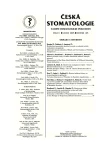-
Medical journals
- Career
Evaluation of the Effect of Propriosensitive Re-education Exercise in the Therapy of Temporomandibular Disorders
Authors: D. Hanáková 1; B. Jureček 1; P. Konečný 2
Authors‘ workplace: Klinika ústní, čelistní a obličejové chirurgie LF UP a FN, Olomouc přednosta prof. MUDr. J. Pazdera, CSc. 1; Klinika rehabilitačního a tělovýchovného lékařství LF UP a FN, Olomouc přednosta MUDr. A. Krobot, Ph. D. 2
Published in: Česká stomatologie / Praktické zubní lékařství, ročník 105, 2005, 1, s. 30-34
Overview
Rehabilitation exercise is considered as a supplementary method within the framework of the complex therapy of temporomandibular disorders. However, is importance is probable much higher. Its especially contributes to mobilization of the joint, and evokes optimal function of masticatory muscles and correct locomotion stereotypes. The authors evaluated the efficiency of simple rehabilitation exercise in most frequent temporomandibular disorders – the disorders of disc-condyle complex and hypermobility of the joint in comparison with standard methods. The results of the study make it clear that from the standpoint of subjective evaluation of the patient is the success of treatment higher or comparable with commonly used conservative procedures.
Key words:
temporomandibular disorders – rehabilitation – propriosensitive rehabilitation – temporomandibular joint – therapy
Labels
Maxillofacial surgery Orthodontics Dental medicine
Article was published inCzech Dental Journal

2005 Issue 1-
All articles in this issue
- Are We Able to Take Care of Our Own Dentition? Results of Examination of Oral Hygiene in the High-School Population
- Titanium Disc Modified with Hydroxyapatite and Zirconia Does not Reveal Signs of Cytotoxicity
- Growth of the Stabilized HeLa Cell line in Chromium-Cobalt Extract of Surface – Layered Titanium Nitride and Zirconium Nitride
- Treated by Stomatology Patients in the Cooperation with Anesthesiologist
- Molecular Genetic Identity of Blood and Oral Isolates of Viridans Streptococci
- Measurement of the Shear Bond Stability of Different Generation Dental Adhesives
- Bonded Amalgam Filling – Part II: Clinical Evaluation after 7, 8 and 9 Years
- Corrosion Resistance of Titanium in Dentistry Applications
- Application of Shape-Memory Stapes in Osteosynthesis of Mandible Fracture
- Evaluation of the Effect of Propriosensitive Re-education Exercise in the Therapy of Temporomandibular Disorders
- Czech Dental Journal
- Journal archive
- Current issue
- Online only
- About the journal
Most read in this issue- Corrosion Resistance of Titanium in Dentistry Applications
- Evaluation of the Effect of Propriosensitive Re-education Exercise in the Therapy of Temporomandibular Disorders
- Bonded Amalgam Filling – Part II: Clinical Evaluation after 7, 8 and 9 Years
- Molecular Genetic Identity of Blood and Oral Isolates of Viridans Streptococci
Login#ADS_BOTTOM_SCRIPTS#Forgotten passwordEnter the email address that you registered with. We will send you instructions on how to set a new password.
- Career

